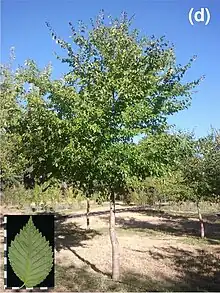Ulmus 'Toledo'
The elm cultivar Ulmus 'Toledo' was raised from seed collected in 1999 from a tree believed to be Ulmus minor growing in the eponymous city (39°51′51″N 4°1′30″W),[1] by researchers at the Escuela Técnica Superior de Ingenieros de Montes, Universidad Politėcnica de Madrid. However, retrospective DNA analysis revealed that the clone also had Ulmus pumila DNA, the species introduced to Spain at the end of the 16th century,[1] and has consequently been dropped from the research programme.[2]
| Ulmus 'Toledo' | |
|---|---|
 'Toledo' | |
| Genus | Ulmus |
| Cultivar | 'Toledo' |
| Origin | Spain |
'Toledo' was introduced to the UK in 2020 as part of an assessment by Butterfly Conservation of DED-resistant cultivars as potential hosts of the endangered White-letter Hairstreak.[2]
Description
'Toledo' grew at a comparatively fast rate of 89 cm per annum in the trials at Puerta de Hierro, Madrid. The erect branches form an irregular crown and are devoid of corky tissue. The leaves, on 6 mm petioles, are ovate, typically acuminate at the apex, the average length and width 47 × 27 mm, the margins doubly serrate. Foliar density relative to 'Sapporo Autumn Gold' is described as 'high'. In the Madrid study, the appearance of the tree was rated 2.9 / 5. [1] The leaves flush in early April (week 14) in southern England.
Pests & diseases
'Toledo' was found to have a very high resistance to Dutch Elm Disease, on a par with, if not greater than, the hybrid cultivar 'Sapporo Autumn Gold'.[1]
Accessions
- Europe
- Grange Farm Arboretum, Lincolnshire, UK. Acc. no. not known.
- Great Fontley Farm, Hampshire, UK. Butterfly Conservation elm trial plantation. One small sapling planted 2020.
References
- Martín, JA; Solla, A; Venturas, M; Collada, C; Domínguez, J; Miranda, E; Fuentes, P; Burón, M; Iglesias, S; Gil, L (2015-04-01). "Seven Ulmus minor clones tolerant to Ophiostoma novo-ulmi registered as forest reproductive material in Spain". IForest - Biogeosciences and Forestry. Italian Society of Sivilculture and Forest Ecology (SISEF). 8 (2): 172–180. doi:10.3832/ifor1224-008. ISSN 1971-7458.
- Brookes, A. H. (2020). Great Fontley Elm Trial, 2020 Report. Butterfly Conservation, Lulworth, UK.